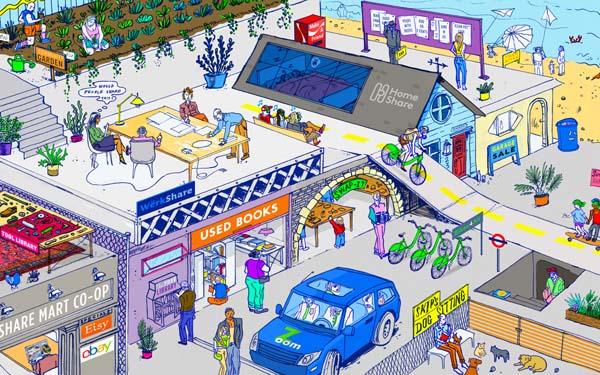
Approximately 80 million Americans took part in the sharing economy last year – from donating unwanted clothes to renting movies from Netflix, marketing firm Leo Burnett estimates. But sharing, borrowing and renting may not be as popular as the media buzz around collaborative consumption would have us believe. According to a new report from the global advertising agency, over 50 percent of U.S. adults surveyed said they would still prefer to own, rather than share.
In The Sharing Economy: Where We Go From Here, Leo Burnett aimed to delve deeper into the findings from a recent worldwide Nielsen survey, in which the company discovered that Americans lag far behind other countries in our participation in the mesh economy.
“Given the United States represents the largest economy in the world and the third largest population, and given the wealth and access to innovation in the U.S. economy, one might have expected the country to be a leader when it comes to the emerging phenomenon of the sharing economy,” the study’s authors wrote.
But that is not the case. Thus, the Leo Burnett study focuses on the U.S. market and examines how different populations interact with the sharing economy – while previous market research studies have looked at the global sharing economy and treated each nation as a “homogenous entity,” the company said.
In a survey of nearly 4,500 U.S. adults, most respondents had not even heard about the most cutting-edge, media-hyped sharing companies. Only a third of Americans were familiar with brands like Airbnb and TaskRabbit, while even fewer – 1 in 5 – were aware of companies like “Netflix for Legos” Pley and parking space rental service Park At My House (now Just Park). Moreover, 3 out of 4 Americans said they hadn’t even heard of the terms “sharing economy,” “conscious consumption” or “mesh economy” – despite the concept being featured in more than 4,000 articles and 3,800 publications in the last year, the report noted.
However, nearly all Americans (96 percent) knew about the “founding fathers” of the mesh economy: eBay, Craiglist and Netflix.
When it comes to engagement in the sharing economy, more than 50 percent of Americans tend to participate with more traditional methods of sharing, as well as the more established digital avenues – rather than taking advantage of the most radical services like Uber and Airbnb. The most common sharing behaviors include using Wikipedia (72 percent); reading user-generated product reviews online (68 percent); donating clothes and household goods to charity (68 percent); loaning or borrowing a product to a friend or family member (64 percent); buying food from a farmers’ market (54 percent); and renting a movie from Netflix or a cable/satellite provider (51 percent).
In contrast, only 6 percent of survey respondents rented cars by the hour through a service like Zipcar or shared rides though Lyft or Uber rather than hailing a cab; and only 5 percent rented out their home for a short term using a website like Airbnb. So yes, sharing is happening, the report’s authors concluded, but in a more traditional manner – not the most innovative, talked-about ways.
So, why does Leo Burnett think that Americans are sharing less than our international counterparts? Despite a long history of sharing in the United States (pioneer wagon trains and 1950s garage sales, for example), our country also has a long history of private property and places high value on the concept of ownership, the report’s authors said.
“For most Americans, owning a home and a car and advancing the next generation higher up the economic ladder are still the defining characteristics of the American dream of success,” they wrote.
Countries that are communist, formerly communist or socialist – particularly if they also have Eastern cultural traditions – are more likely to engage in conscious consumption, such as Asian, Middle Eastern and African nations, the report found. North American and Oceanic countries, with our capitalist economic system and individualistic Western culture, are the least likely to do so.
That’s why 52 percent of survey respondents said they agreed with this statement, “I think most people would rather own than share, if they can afford to.” And, in general, the report found that Americans’ emotional attachment to ownership cut across demographics – gender, income, age and location.
What do these somewhat grim findings mean for sharing-based startups or companies like Pley or Kitchit looking to grow their businesses? The report, which aims to help marketers promote these types of companies, offered numerous recommendations, including reminding us that, years ago, companies like eBay and Netflix were relatively unheard-of; now they’re household names. Businesses entering the mesh economy should plan for initial niche acceptance in specific demographic segments, the authors said.
Also, keep in mind Americans’ cultural preference for ownership, the author’s advised. Companies that focus on products or services that are more established in the sharing economy – like movies or rides – will tend to perform better than products “where ownership and its benefits are very entrenched and valued, often for non-rational reasons. In a country like the United States, anything that begins to call into question the benefits of ownership or pushes too hard toward the collective will likely face an uphill battle.”
Image credit: Kyle Poff, Leo Burnett
Passionate about both writing and sustainability, Alexis Petru is freelance journalist and communications consultant based in the San Francisco Bay Area whose work has appeared on Earth911, Huffington Post and Patch.com. Prior to working as a writer, she coordinated environmental programs for Bay Area cities and counties. Connect with Alexis on Twitter at @alexispetru

Passionate about both writing and sustainability, Alexis Petru is freelance journalist and communications consultant based in the San Francisco Bay Area whose work has appeared on Earth911, Huffington Post and Patch.com. Prior to working as a writer, she coordinated environmental programs for various Bay Area cities and counties for seven years. She has a degree in cultural anthropology from UC Berkeley.














